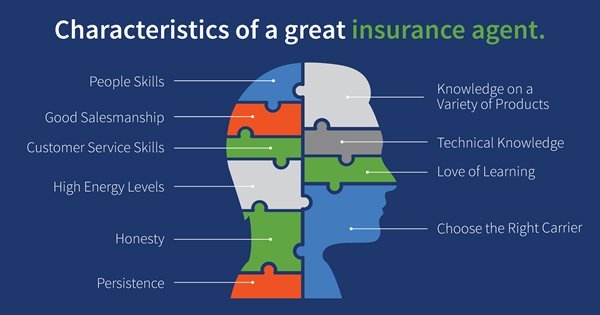As an insurance agent, you play a crucial role in helping individuals and businesses safeguard their assets and manage risk. However, as with any profession, there are risks associated with your role that need to be managed. Having the right insurance coverage is essential to protect yourself, your business, and your clients. In this comprehensive guide, we’ll explore the types of insurance you need as an insurance agent, with a focus on general liability insurance and other key coverages.
Understanding the Risks for Insurance Agents
Before delving into specific insurance types, it’s important to understand the risks faced by insurance agents. These risks can include:
- Errors and Omissions: Providing incorrect or inadequate advice to clients.
- Professional Liability: Claims of negligence or failure to perform professional duties.
- General Liability: Risks related to third-party bodily injury or property damage.
1. General Liability Insurance
What is General Liability Insurance?
General liability insurance is designed to protect your business from claims related to bodily injury, property damage, and personal injury that may occur as a result of your business operations. For insurance agents, this type of coverage is crucial as it provides protection against:
- Slip and Fall Accidents: If a client or visitor is injured on your premises.
- Property Damage: Damage caused to someone else’s property due to your business operations.
- Advertising Injury: Claims related to false advertising or defamation.
Why Do Insurance Agents Need General Liability Insurance?
Even though insurance agents primarily deal with policies and advice rather than physical products or services, they still face potential liabilities. For example:
- Client Meetings: If a client trips and falls in your office.
- Home Office: If you work from home and a visitor gets injured on your property.
- Marketing Materials: If a client claims your advertising was misleading or defamatory.
General liability insurance ensures that you’re protected against these types of risks, helping to cover legal fees, settlements, and other related costs.
2. Professional Liability Insurance
What is Professional Liability Insurance?
Professional liability insurance, also known as errors and omissions (E&O) insurance, is designed to protect against claims of negligence, errors, or omissions in the performance of your professional duties. For insurance agents, this is particularly important because:
- Advisory Role: You provide advice and recommendations that clients rely on.
- Errors: Mistakes in policy recommendations or coverage explanations can lead to claims.
- Omissions: Failing to mention certain coverage options or important details can result in client claims.
Why is Professional Liability Insurance Crucial for Insurance Agents?
Insurance agents are often exposed to claims of professional negligence, even if these claims are unfounded. Professional liability insurance helps cover the costs associated with defending against such claims, including:
- Legal Fees: Costs of hiring a lawyer to defend against allegations.
- Settlements: Payments made to settle claims out of court.
- Judgments: Payments required if a claim goes to court and you lose.
3. Business Owner’s Policy (BOP)
What is a Business Owner’s Policy?
A Business Owner’s Policy (BOP) combines general liability insurance with property insurance, offering a comprehensive package of coverage for small business owners. For insurance agents, a BOP can be advantageous because it includes:
- Property Insurance: Covers damage to your office or business property due to fire, theft, or other covered events.
- General Liability Insurance: As discussed earlier, this protects against third-party claims of bodily injury and property damage.
Why Consider a BOP?
A BOP provides a cost-effective way to secure both property and liability coverage in one policy. This can be particularly beneficial for insurance agents who operate from a physical office, as it simplifies managing your insurance needs and often results in cost savings compared to purchasing these coverages separately.
4. Workers’ Compensation Insurance
What is Workers’ Compensation Insurance?
Workers’ compensation insurance provides coverage for employees who are injured or become ill as a result of their work. This coverage includes:
- Medical Expenses: Costs related to treating work-related injuries or illnesses.
- Lost Wages: Compensation for employees who are unable to work due to their injuries.
- Disability Benefits: Coverage for long-term disabilities resulting from work-related injuries.
Why Do Insurance Agents Need Workers’ Compensation Insurance?
If you have employees or even independent contractors working for you, workers’ compensation insurance is crucial. It ensures that you’re compliant with state regulations and protects your business from potential lawsuits related to workplace injuries.
5. Cyber Liability Insurance
What is Cyber Liability Insurance?
Cyber liability insurance provides coverage for risks related to data breaches and cyberattacks. This can include:
- Data Breach Costs: Expenses related to notifying affected individuals, offering credit monitoring, and managing the breach.
- Legal Fees: Costs associated with defending against lawsuits resulting from the breach.
- Business Interruption: Coverage for lost income due to disruptions caused by a cyberattack.
Why is Cyber Liability Insurance Important for Insurance Agents?
As an insurance agent, you handle sensitive client information, including personal and financial data. A data breach could have serious consequences, including:
- Reputational Damage: Loss of client trust and potential impact on your business.
- Legal Costs: Potential legal actions resulting from the breach.
- Regulatory Fines: Penalties for failing to comply with data protection regulations.
Cyber liability insurance helps mitigate these risks and provides support in the event of a cyber incident.
6. Commercial Auto Insurance
What is Commercial Auto Insurance?
Commercial auto insurance covers vehicles used for business purposes. This can include:
- Liability Coverage: Protection against claims for bodily injury or property damage caused by your business vehicle.
- Collision Coverage: Coverage for damage to your business vehicle in case of an accident.
- Comprehensive Coverage: Protection against non-collision-related damages, such as theft or vandalism.
Why Do Insurance Agents Need Commercial Auto Insurance?
If you use a vehicle for business activities, such as meeting clients or running business errands, commercial auto insurance is necessary. Personal auto insurance typically doesn’t cover business use, so having commercial auto insurance ensures that your vehicle is protected and that you’re compliant with legal requirements.
As an insurance agent, having the right insurance coverage is essential to protect yourself, your business, and your clients. General liability insurance is a fundamental component of this coverage, safeguarding against third-party claims of bodily injury and property damage. However, it’s also important to consider additional coverages such as professional liability insurance, a business owner’s policy, workers’ compensation insurance, cyber liability insurance, and commercial auto insurance.
By understanding and securing these various types of insurance, you can effectively manage the risks associated with your profession and focus on providing valuable services to your clients. Make sure to work with a knowledgeable insurance advisor to tailor a coverage plan that meets your specific needs and ensures comprehensive protection for your business.




















